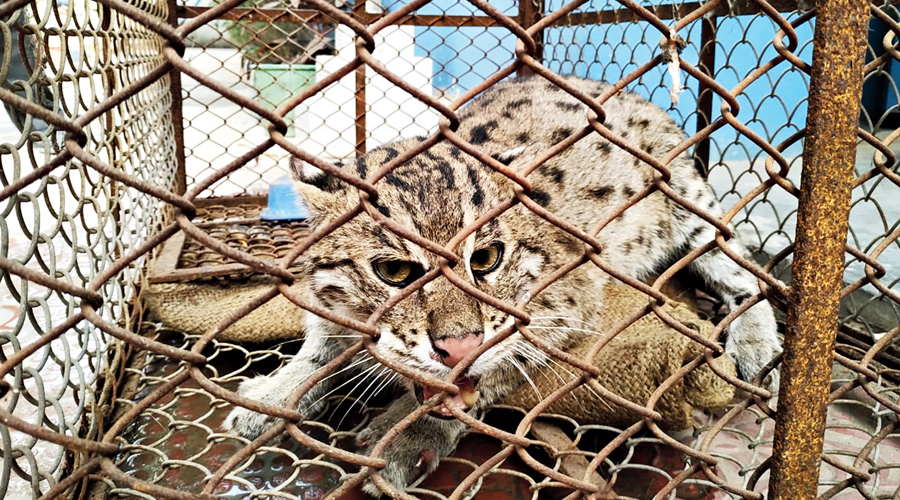A fishing cat was rescued by a group of animal lovers from a dry well in a village in North 24-Parganas on Tuesday evening.
The cat fell into the 25ft-deep newly-dug well in Bagda, around 100km from Calcutta.
The sub-divisional police officer alerted an NGO about the animal, following which a team of four members reached the spot.
Along with a couple of foresters, the rescue operation started around 4pm. A ladder and a noose were the only “equipment” at the disposal of the team. A cage was brought later.
The cat was brought up after an hour. Not before one of the team members, Kaushik Chakraborty, suffered a bite.
“There were hundreds of people surrounding the well. The cat was very scared,” said Chakraborty, 21, a member of Bongaon Green Wave, an NGO that has been active in Bongaon and adjacent areas in organising nature camps with children and including villagers in conservation efforts.
The cat was taken away by the forest department and will be released soon, said a local forest official.
There have been several instances in the recent past of fishing cats, Bengal’s state animal, being killed in different parts of the state.
The Telegraph had on November 27 reported that at least eight fishing cats had allegedly been killed across the state since May 2020. The last was allegedly beaten to death by some residents of a village in Howrah’s Shyampur block on November 26.
Fishing cat, baghrol in Bengali, is included in Schedule I of the Indian Wildlife (Protection) Act, 1972.
The nocturnal animal thrives in wetlands and feeds mostly on fish. Shrinking wetlands has dwindled their numbers and forced them to stray into human settlements and prey on fish in ponds and livestock.
A Facebook post by Bongaon Green Waves on the rescue operation has generated significant online traction. “The best part is now the people don't beat or kill these creatures, after our enormous awareness camps the local people of Bonagon and surroundings are aware…. If they find any kind of wild animals… they immediately inform us or the police or forest department,” says the post.
“In the wake of decreasing wetland habitat and increasing negative interactions between humans and fishing cats, this incidence gives much hope. More eyes and ears are looking out for the state animal now who are responding on time to reduce threats,” said Tiasa Adhya, the founder of the Fishing Cat Project, a campaign for research on and conservation of the animal.











